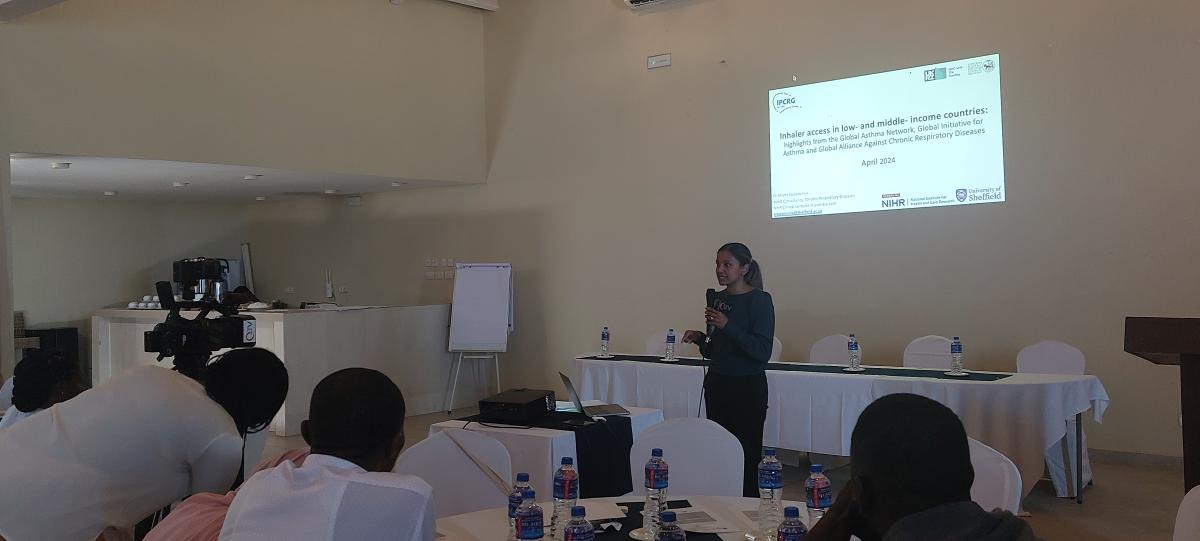Lavanya Vijayasingham
Lived experience as untapped capital and power in the global health knowledge ecosystem
Meaningful Engagement of People with Lived Experiences
12 Dec 2025
NIHR, IPCRG, Medical Research Council Unit The Gambia at London School of Tropical Medicine and Hygiene (LSHTM), WHO | 21 Oct 2024
National Institute for Health Research (NIHR), International Primary Care Respiratory Group (IPCRG), Medical Research Council Unit The Gambia at London School of Tropical Medicine and Hygiene (LSHTM), World Health Organization
For people in low- and middle-income countries living with asthma, controlling their symptoms is often challenging. The lack of national asthma guidelines and diagnostic testing lead to under-diagnosis and under-treatment of this major noncommunicable disease. Recommendations for asthma management are included in the WHO package of essential interventions for noncommunicable disease interventions. Yet, in The Gambia limited access to essential inhaled medicines and perceived harms pose major implementation challenges. A recent qualitative study and dissemination workshop aimed to tackle these pressing issues.

The International Primary Care Respiratory Group (IPCRG) funded a qualitative study exploring patients with asthma and health care workers’ perceptions of inhaler use in three health care facility facilities in The Gambia, at the Kanifing General Hospital, Edward Francis Small Teaching Hospital Bakau Minor Health Centre, and the Medical Research Council Unit The Gambia at LSHTM Clinic (MRC Clinic).
To help translate findings into improved patient and health care worker communication, study findings were shared at a dissemination workshop, with representation from study participants, patients, health care workers and the Ministry of Health in The Gambia.
The event was opened by Dr. Kebba S. Bojang from The Ministry of Health with a poem co-written and read by Ms. Rugiatou F. Badjie, a nursing student from the University of The Gambia, who also lives with asthma. Jainaba Sonko, a TV presenter, then shared her personal experiences of living with asthma in The Gambia.
In the study, patients and health care workers widely recognized the benefits of using inhalers to control asthma symptoms. However, they confirmed the lack of access to inhalers and reported having to rely on using oral salbutamol tablets, a medication removed from the WHO essential medicines list in 2011 due to its slower onset of action and increased side effect.
Patients and health care workers also reported that community members perceived harms from inhaler use and were concerned about the risks of dependence. Some study participants believed that inhaling medication would put lives at risk.
To address these challenges, both patients and health care workers in The Gambia agreed that there is a need for patient education and increasing community awareness, while investing in more affordable access to inhalers, staff training and education, and improved diagnostic testing for asthma.
“This study was an important step, being one of the first of its kind in the country to gain a broad understanding, in a scientific way, of the low usage of inhalers by asthma patients and their families. From the workshop we were able to gain a better understanding of the barriers to inhaler access. This will help us as at the Ministry, in addition to sensitisation and raising awareness of the use of inhalers, to ensure they are available and affordable in all health regions in the country.” Dr. Kebba S. Bojang, Ministry of Health, The Gambia
Feedback on the dissemination workshop was overwhelmingly positive, and several participants suggested holding additional training events and committed to forming a national asthma association. There is a pressing need for change to improve asthma care in The Gambia as well as in other low- and middle-income countries, and both patients and health care workers are ready to drive that change. Increasing inhaler access and investing in addressing sociocultural factors in addition to medication supply is a promising way forward.
Related content/Links: